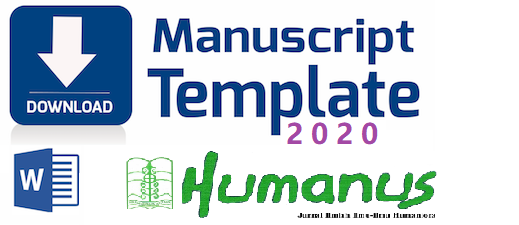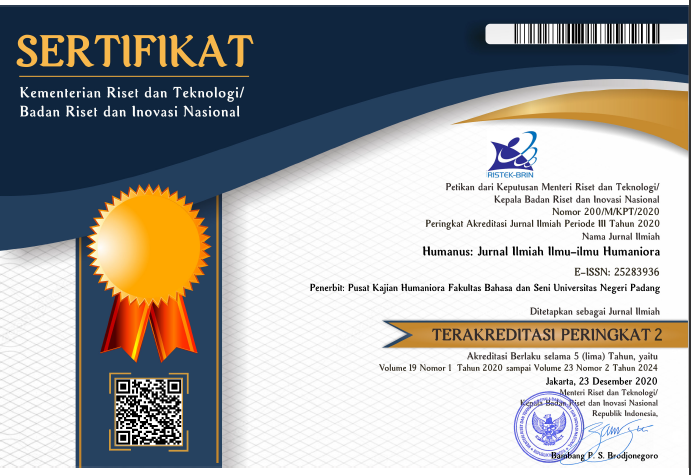COMMUNICATION OF THE CHILDREN WITH AUTISM IN SLBN SURAKARTA: GRICE’S COOPERATIVE PRINCIPLES
 ), Djatmika Djatmika(2), Dwi Purnanto(3),
), Djatmika Djatmika(2), Dwi Purnanto(3), (1) Universitas Sebelas Maret
(2) Universitas Sebelas Maret
(3) Universitas Sebelas Maret
 Corresponding Author
Corresponding Author
Copyright (c) 2019 Humanus
DOI : https://doi.org/10.24036/humanus.v18i2.107170
Full Text:
 Language :
Language :
Abstract
References
Baron-Cohen, S. (2008). The Facts: Autism and Asperger Syndorme (1st ed.). New York: Oxford University Press.
Baron-cohen, S., & Bolton, P. (1993). Autism: The Facts. New York: Oxford University Press.
Birner, B. J. (2013). Introduction to Pragmatics. West-Sussex: Willey-Blackwell.
Dornyei, Z. (2007). Research Method in Applied Linguistics. Oxford: Oxford University Press.
Ezmar, & Ramli. (2014). Bahasa Anak Autis pada SLB Cinta Mandiri Lhoksumawe. Jurnal Metamorfosa, 2(2), 1–18. https://doi.org/10.1017/CBO9781107415324.004
Frith, U. (2008). Autism : Very Short Introduction. New York: Oxford University Press.
Grice, H. P. (1989). Studies in the Way of Words. Cambridge: Harvard University Press.
Grossman, R. B., Bemis, R. H., Skwerer, D. P., & Tager-Flusberg, H. (2010). Lexical and affective prosody in children with high-functioning Autism. Journal of Speech, Language, and Hearing Research, 53(3), 778–793. https://doi.org/10.1044/1092-4388(2009/08-0127)
Hadis, A. (2006). Pendidikan Anak Berkebutuhan Khusus. Bandung: Alfabeta.
Huang, Y. (2007). Pragmatics. New York: Oxford University Press.
Jones, C. D., & Schwartz, I. S. (2009). When asking questions is not enough: An observational study of social communication differences in high functioning children with autism. Journal of Autism and Developmental Disorders, 39(3), 432–443. https://doi.org/10.1007/s10803-008-0642-y
Lam, Y. G., & Yeung, S. S. S. (2012). Towards a convergent account of pragmatic language deficits in children with high-functioning autism: Depicting the phenotype using the pragmatic rating scale. Research in Autism Spectrum Disorders, 6(2), 792–797. https://doi.org/10.1016/j.rasd.2011.08.004
Larkin, F., Hobson, J. A., Hobson, R. P., & Tolmie, A. (2017). Collaborative competence in dialogue: Pragmatic language impairment as a window onto the psychopathology of autism. Research in Autism Spectrum Disorders, 43–44(September), 27–39. https://doi.org/10.1016/j.rasd.2017.09.004
Leech, G. (1993). Prinsip-prinsip Pragmatik. Jakarta: Universitas Indonesia Press.
Loveland, K. A., Landry, S. H., Hughes, S. O., Hall, S. K., & McEvoy, R. E. (1988). Speech acts and the pragmatic deficits of autism. Journal of Speech and Hearing Research, 31(4), 593–604. https://doi.org/10.1044/jshr.3104.593
Paul, R., Bianchi, N., Augustyn, A., Klin, A., & Volkmar, F. R. (2008). Production of syllable stress in speakers with autism spectrum disorders. Research in Autism Spectrum Disorders, 2(1), 110–124. https://doi.org/10.1016/j.rasd.2007.04.001
Peeters, T. (2012). Panduan Autisme Terlengkap. Jakarta: Dian Rakyat Press.
Rakasiwi, R. A., Putra, I. B., & Suandi, N. (2014). Penerapan Prinsip Kerja Sama dan Prinsip Kesantunan pada Pembelajaran Bahasa Indonesia dengan Pendekatan Saintifik oleh Siswa Kelas IV SD Jembatan Budaya. Jurnal Pendidikan Dan Pembelajaran Bahasa Indonesia, 3(1). Retrieved from http://oldpasca.undiksha.ac.id/e-journal/index.php/jurnal_bahasa/article/view/1427
Rubin, E., & Lennon, L. (2004). Challenges in social communication in Asperger syndrome and high-functioning autism. Topics in Language Disorders, 24(4), 271–285. https://doi.org/10.1097/00011363-200410000-00005
Sari, H. C. (2013). Pengaruh Dongeng terhadap Kemampuan Bicara Anak Autis Disertai Gangguan Bahasa di SDLB Shanti Kosala, Nganjuk. Jurnal Pendidikan Khusus, 1(1).
Sastra, G. (2011). Neurolinguistik: Suatu Pengantar. Bandung: Alfabeta.
Sastry, A., & Aguirre, B. (2014). Parenting Anak dengan Autisme: Solusi, Strategi, dan Saran. Praktis Umum untuk Membantu Keluraga Anda. Yogyakarta: Pustaka Pelajar Indonesia.
Shriberg, L. D., Paul, R., McSweeny, J. L., Klin, A., Cohen, D. J., & Volkmar, F. R. (2001). Speech and prosody characteristics of adolescents and adults with high-functioning autism and Asperger syndrome. Journal of Speech, Language, and Hearing Research, 44(5), 1097–1115. https://doi.org/10.1044/1092-4388(2001/087)
Shriberg, Lawrence D., Paul, R., Black, L. M., & Van Santen, J. P. (2011). The hypothesis of apraxia of speech in children with autism spectrum disorder. Journal of Autism and Developmental Disorders, 41(4), 405–426. https://doi.org/10.1007/s10803-010-1117-5
Subroto, E. (2007). Pengantar Metode Penelitian Linguistik Struktural. Surakrata: UNS Press.
Sudaryanto. (1993). Metoda dan Aneka Teknik Analisis Bahasa. Yogyakarta: Duta Wacana University Press.
Sussman, S., & Sklar, J. L. (1969). The Social Awareness of Autistic Children. American Journal of Orthophyciatrist, 39(798–806).
Veskarisyanti, G. A. (2008). 12 Terapi Autis Paling Efektif & Hemat untuk Autisme, Hiperatif, & Retardasi Mental. Yogyakarta: Pustaka Anggrek.
Yistiana, R. A., Sudiana, I. N., & Indriana, M. S. (2014). Penggunaan Prinsip Kerja Sama dalam Kegiatan Berbicara Siswa Kelas VIII di MTs. Al-Khairiyah Tegallinggah Kecamatan Sukasada. Jurnal Pendidikan Bahasa Dan Sastra Indonesia Undiksha, 2(1). Retrieved from https://ejournal.undiksha.ac.id/index.php/JJPBS/article/view/2524/
 Article Metrics
Article Metrics
 Abstract Views : 746 times
Abstract Views : 746 times
 PDF Downloaded : 277 times
PDF Downloaded : 277 times
Refbacks
- There are currently no refbacks.
Copyright (c) 2019 Humanus

This work is licensed under a Creative Commons Attribution-NonCommercial 4.0 International License.










